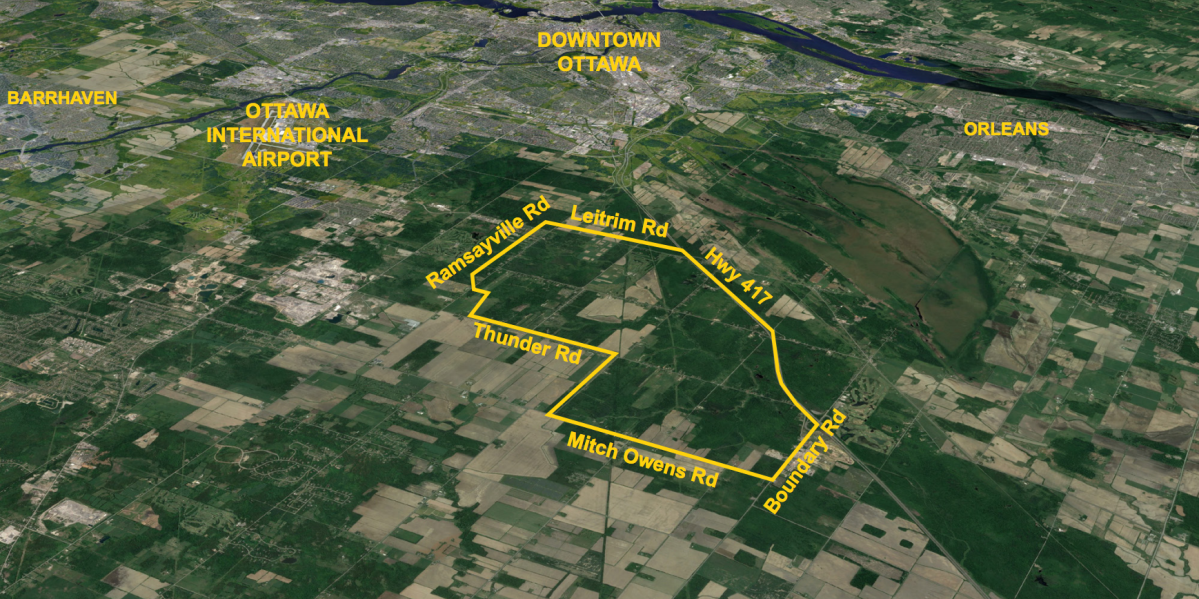Ottawa city council voted to include the lands for a proposed community from the Algonquins of Ontario in its urban boundary expansion at its meeting on Wednesday, despite calls for further consultation and land studies from some councillors and First Nations leaders in Quebec.

The urban boundary dominated most of the discussion at Wednesday’s meeting. Council had voted last spring to expand the city’s urban boundary by 1,281 hectares to make room for the next 25 years of population growth; this week’s meeting gave the green light on which lands will comprise that expansion.
The controversial piece of land up for discussion at this week’s council meeting is 445 hectares for a proposed community called Tewin off Highway 417 in the east end, near Amazon’s Boundary Road distribution centre. For context, the neighbourhood would be roughly double the size of Ottawa’s Blackburn Hamlet suburb.
The Algonquins of Ontario have proposed to construct the Tewin community with their development partner, Taggart Group.
While the proposal to include the Tewin lands was not originally in city planning staff’s recommendation for the urban boundary expansion, a late motion at a joint committee meeting two weeks ago saw the lands included in the final report for council consideration.
Some councillors and Ottawa’s mayor cited the inclusion of the Tewin property as “reconciliation” — an assertion that upset numerous Algonquin Anishinabeg chiefs. Multiple Algonquin leaders wrote to Mayor Jim Watson last week to explain that the Algonquins of Ontario group is not recognized as a legitimate First Nations entity by Indigenous groups based largely on the Quebec side of the Ottawa River.
- Some fixed mortgage rates are up despite hints of Bank of Canada cuts. Why?
- Carbon rebate payments going out to some Canadians. Here’s what to expect
- Health task force blasted over ‘dangerous guidance’ for cancer screenings
- Boy’s body pulled from Lake Ontario after friend, passerby tried to save him
They called for further consultation on the Tewin project, which was purchased by AOO from the Ontario Government outside of treaty negotiations. Algonquin Anishinabeg lands, which cover both sides of the Ottawa River, have never been ceded in treaties.
Numerous Ottawa councillors, including Gloucester-Southgate Coun. Diane Deans, called for a pause on the Tewin land decision so more fulsome consultation could be done with other Algonquin leaders.
“If we are truly serious about reconciliation — and I hope that we are — we have to listen,” Deans said.
“If the elders and chiefs from the Algonquin nation, people who we have invited into our council chamber to bless us, are telling us that they need time to understand this … it is not for us to provide a token response. It is time for us to pause and listen in a meaningful way.”

Wednesday’s meeting saw some councillors take a step back from claims of reconciliation, positioning the controversy as a debate conflict between Algonquin nations the city did not want to adjudicate.
Watson called Tewin a “thoughtful plan” and deferred to the AOO’s conviction in the project, which is backed by Chief Wendy Jocko of the Algonquins of Pikwakanagan.
“They believe it’s reconciliation and I’m not going to second-guess their views on that,” he said.
“There’s obviously a difference of opinion between some members of the Algonquin nations, particularly on the Quebec side, but when all is said and done, this does boil down to a planning issue and a land development issue. It’s not a treaty issue.”
Watson did, however, acknowledge that Tewin would have been a “harder sell” without the AOO’s involvement when speaking to media after council.
Council later passed a motion to meet with Grand Chief Verna Polson of the Algonquin Anishinabeg Nation Tribal Council and other chiefs to discuss ways to improve consultation on future developments.
From a planning perspective, the Tewin lands come with a series of risks and unknowns.
One of the downsides staff first identified in the report evaluating the lands was the distance from reliable transit routes. Some councillors wanted to give staff more time to study the impact the proposed community would have on the city’s greenhouse gas emissions.
The distance from the city’s core would also spur higher infrastructure costs, though Watson was quick to point out when asked about this that the proponents are charged with paying for any development costs such as installing wastewater systems.
The quality of the site’s foundation is also of concern due to high levels of marine clay in the soil.
Stephen Willis, the city’s general manager of planning, noted that soil quality is likely to be a concern no matter where Ottawa chooses to expand its urban boundary, as all the city’s good land was built on “years ago.”
While multiple motions at Wednesday’s meeting asked councillors to delay or revise the final decision on the Tewin lands until further studies and consultations could be done, the looming deadline to finalize Ottawa’s new Official Plan within this term of council spurred most members to move forward with the proposal.
Many council members, including Cumberland Coun. Catherine Kitts, whose ward includes the proposed Tewin development, noted that going forward with the land does not automatically provide site plan approval to the project.
There will be ample opportunity for further consultation on the proposed community before any shovels are in the group on Tewin, Kitts noted.





Comments